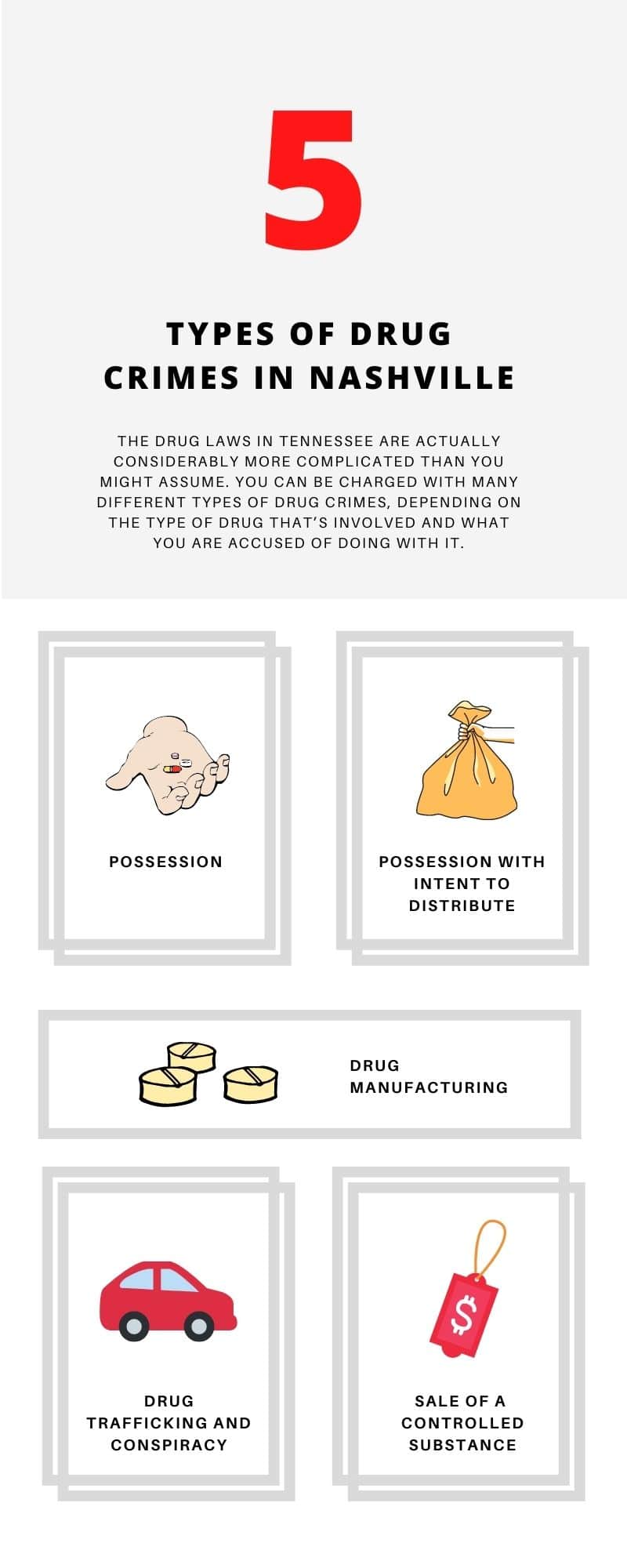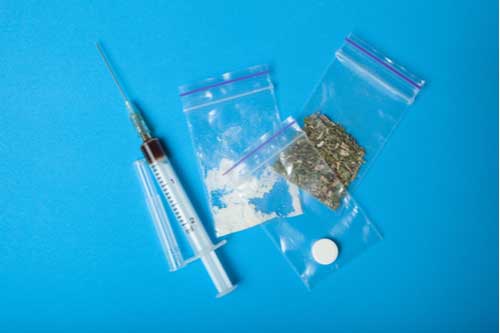Tennessee takes a hardline stance when it comes to drug crimes and has relatively harsh penalties for those that are convicted. So strict are the drug laws in the state that even marijuana isn’t allowed for medicinal use and there are actually serious penalties for the drug, depending on the amount. It is thus not hard to imagine that penalties for committing other drug crimes are severe.
If you have been arrested on a drug-related charge in Nashville, Tennessee, you have the option of enlisting the services of a qualified lawyer. Fortunately, the Nashville drug crimes defense lawyers at Nash Law understand just how catastrophic a drug crime conviction can be and are willing to help. Call our criminal defense attorneys at 615-NASH-LAW or fill out the contact form provided to schedule a consultation.
Table of Contents
What Are the Types of Drug Crimes in Nashville, Tennessee?
The drug laws in Tennessee are actually considerably more complicated than you might assume. You can be charged with many different types of drug crimes, depending on the type of drug that’s involved and what you are accused of doing with it.
Here are the top 5 drug crimes that you can be charged with in Tennessee:
Possession
A drug possession charge means that you have been found having an illegal drug, such as heroin, cocaine, marijuana, ecstasy, methamphetamines, or any other controlled substances, in your possession.
Possession is a Class A misdemeanor that may result in incarceration for up to 11 months and 29 days and a fine of up to $2,500. A second possession offense or greater may be categorized as a Class E felony that carries a possible sentence of 1 to 6 years and a fine of up to $3,000.
Possession with Intent to Distribute
Possession with intent to distribute refers to being found having a controlled substance in amounts to large to be likely intended for personal use. It is a felony offense in Tennessee. The reason why “with intent” is included in the charge is because the amount implies that the possessor intended to sell the controlled substance.
Possession of items such as scales for weighing drugs for resale, bags, or other containers used for drug packaging, etc. may contribute to an elevated charge of intent to distribute. However, it doesn’t mean that the offender is automatically assumed to be guilty of a drug crime; the state of Tennessee is still required to prove the charge beyond a reasonable doubt.
Sale of a Controlled Substance
Sale of a controlled substance is a felony in Tennessee. Any sale, regardless of the quantity involved, us classified as a felony in the state. It is typically charged when an undercover police officer or a confidential informant actually witnesses a drug sale.
Just like is the case with possession with intent to distribute, sale of a controlled substance is a felony, but the penalties here depend heavily on the type of drug sold, the amount sold, and the number of prior offenses (if any) the person being charged has on their record.
Drug Trafficking and Conspiracy
Drug trafficking is also known as drug conspiracy and is typically charged when a person is suspected of being involved in any part of the production, transportation, distribution, or sales process of a controlled substance.
Mandatory minimum penalties have been put in place for this charge, which means that a judge can never order a sentence that’s less severe than the required minimum. If you are charged with drug trafficking in Nashville, you face massive fines, a jail term, and long probation periods.
Drug Manufacturing
Drug manufacturing is arguably one of the worst drug crimes that you can find yourself being accused of in Tennessee. It refers to the production of controlled substances, such as growing marijuana or manufacturing meth.
Drug manufacturing is also a felony whose penalties can go beyond fines and jail time. You can be charged with drug manufacturing whether you produced the drugs for your own consumption or for the purpose of selling.
If you are facing any of the drug charges above or any drug crime, even those not included here, it can be a good idea to seek legal counsel from the Nashville drug crimes defense lawyers at Nash Law. We can not only help you fight the charges but also prevent you from suffering the penalties below.
What Are the Penalties for Drug Crimes in Tennessee?
For the five types of drug crimes discussed above, there are coinciding consequences, which are the result of a conviction.
Possession is a Class A misdemeanor that can result in a jail term of up to 11 months and 29 days as well as fines of up to $2,500. If convicted, you may also be required by the court to attend drug education classes.
Possession with intent to distribute, sale of a controlled substance, drug trafficking, and drug manufacturing are all felony charges. A felony conviction usually results in property forfeiture, suspension of your license, fines, jail and/or prison time, community service, and probation.
Felony drug offenses range from Class A felonies to Class E felonies:
- A Class A felony: A range of between 15 and 25 years
- A Class B felony: A range of between 8 and 12 years
- A Class C felony: A range of between 3 and 6 years
- A Class D felony: A range of between 2 and 4 years
- A Class E felony: A range of between 1 and 2 years
Conviction of any number of drug charges will not only result in law-based consequences, but also career-based, familial, and social penalties. Your future career, eligibility for federal student aid, ability to own a firearm, and housing may be affected by a felony conviction.
Given the serious consequences of being convicted of drug charges, it is important for those facing drug crime charges in Tennessee to consider seeking legal assistance. The trusted Nashville drug crimes defense lawyers at Nash Law can challenge the validity of your charges or the supporting evidence. We can also help you seek a less damaging outcome if you are convicted.
What does a Drug’s Schedule Mean?
In Tennessee, it is illegal to possess, distribute, or manufacture certain drugs. These are classified as Schedule I, II, III, IV, or V substances under the Tennessee Code Annotated.
Schedule I
Schedule I drugs are those that the federal government has determined to have a high potential for abuse and no currently accepted medical use in treatment in the United States. Schedule I drugs include heroin, LSD, and ecstasy.
Schedule II
Schedule II drugs are those that have a high potential for abuse and are considered to have a moderate to high dependence liability. They include drugs such as cocaine, methamphetamine, and opium. In Tennessee, Schedule II drugs are classified as controlled substances, meaning they are subject to state regulation. For example, they may be used only with a prescription from a doctor.
Schedule III
Schedule III drugs are those that have a moderate to low potential for abuse and are currently accepted for medical use in treatment in the United States. Some of these drugs include testosterone and codeine. The Controlled Substances Act (CSA) of 1970 placed these drugs into Schedule III of the CSA. The Tennessee Controlled Substance Abuse Prevention and Treatment Act later amended the CSA to include anabolic steroids as a Schedule III drug.
Schedule IV
Schedule IV drugs are those that have a low potential for abuse and dependence, and include medications like Xanax, Valium, and Ambien. In Tennessee, Schedule IV drugs are classified as controlled substances, and are subject to regulation by the state’s Department of Health. Schedule IV drugs may only be prescribed by licensed healthcare providers, and may not be dispensed without a prescription.
Schedule V
Schedule V drugs in Tennessee are those that have a low potential for abuse and are generally used for medical purposes. This includes drugs like cough syrup and codeine. These substances are closely monitored by the government to ensure that they are not being abused.
How Do Drugs and DUI Relate?
Driving Under the Influence (DUI) doesn’t limit the “influence” to alcoholic beverages only. In Tennessee, a driver can be convicted of a DUI if he/she has taken an intoxicating substance of any type before getting behind the wheel.
In Tennessee, you can still be charged with DUI if you cause an auto accident with prescription medication in your system even if you take drugs legally for medical reasons. Furthermore, if you choose to drive while under the influence of drugs, you are required to submit to field sobriety and/or chemical tests if pulled over by a police officer.
The more times you are convicted of a drug-related DUI, the harsher the penalties usually are. If you are convicted more than 3 times, the subsequent offenses will be charged as felonies that are punishable with jail time, fines, or even the loss of driving privileges.
What Is the Difference Between Misdemeanor vs. Felony Drug Charges in Tennessee?
A misdemeanor in Tennessee is a criminal act committed in violation of the laws of the state. Punishment for a misdemeanor drug charge ranges from a minimum of 0 days in jail to a maximum jail term of 11 months and 29 days with a possible fine and/or loss of driving privileges. Possession is the only drug crime in Tennessee that’s considered a misdemeanor.
A felony is also a criminal act committed in violation of the laws of Tennessee. Punishment for a felony drug charge ranges from a minimum jail term of 1 year to a maximum of life in prison with the possibility of fines and other penalties attached. Possession with intent to distribute, sale of a controlled substance, drug trafficking, and drug manufacturing are the main drug charges in Tennessee.
Whether you are facing misdemeanor or a felony drug charges in Nashville, you should get in touch with the skilled Nashville drug crimes defense lawyers at Nash Law at 615-NASH-LAW today to ensure that your rights are defended.
Can I Have a Drug Conviction Expunged in Tennessee?
Yes. In Tennessee, certain misdemeanor and Class E felony convictions can be expunged from your permanent record. To be sure that you are actually eligible and that the petition for expunging your record is drafted and filed properly, it is advisable to consult with an experienced drug crimes lawyer.
To be eligible for expunction, your conviction must be after November 1, 1989, and all the following have to be true:
- You don’t have any other convictions elsewhere
- You have successfully completed all conditions of imprisonment, parole, or probation
- You completed your sentence at least 5 years ago
- You have paid all the costs, fines, and restitution as ordered by the court
- If it was part of your sentence, you have remained free from dependency on or abuse of alcohol or a controlled substance or any other prohibited substance for the period of at least 1 year.
The Class E felony drug offenses that can be expunged, include but aren’t limited to:
- The possession, sale, delivery, or manufacture of a Schedule V drug that attracted a fine of less than $5,000.
- The possession, sale, delivery, or manufacture of not less than 0.5 ounces and not more than 10 pounds of a Schedule VI drug that attracted a fine of less than $1,000.
- The possession, sale, delivery, or manufacture of a Schedule VII drug that attracted a fine of less than $1,000.
- A third offense of simple possession.
- Unlawful drug paraphernalia activities and uses.
- Selling glue for unlawful purposes.
What Are Some Possible Defenses in Drug Crimes Cases?
If you are facing drug charges, the trusted criminal defense lawyers at Nash Law in Nashville can determine which defenses are best suited to your case. Here are two of the most popular defenses that our legal team uses regularly:
No Probable Cause
The Fourth Amendment to the United States Constitution guarantees you the right to due process of law, which includes lawful search and seizure procedures, which are common territory for drug charges. Arguing that police didn’t have probable cause to search your person, vehicle, or home is a possible defense. If your Fourth Amendment rights were violated, we can file for dismissal of the charges and ensure that the drugs are not used at trial.
Not Guilty in Simple Possession Cases
A common defense to any criminal charge is to simply say that you did not do it. The drug possession equivalent is to claim that the drugs are not yours or that you didn’t have any idea that they were in your house or car. In simple possession cases, proving the drugs weren’t yours is another possible defense approach.
For instance, our skilled drug crimes lawyers can pressure the prosecution to prove that the marijuana found in your vehicle belonged to you and not any of the other passengers.
How Much Will Hiring a Nashville Drug Crimes Defense Lawyer Cost?
A drug crime attorney may charge a flat fee for a certain phase of the case or an hourly rate that ranges from $100 to $300 or even more. Either way, you are required to pay the lawyer an advance fee known as a retainer that’s based either on all or part of the flat fee or an estimated number of hours. The hourly fee is deducted from the retainer. Once it is depleted, you will be billed for additional money.
Whether the lawyer is working on a flat fee or hourly rate, retainers for a drug crimes lawyer start around $2,000 to $5,000 for misdemeanors and $5,000 to $15,000 for felonies. Still, it can be as high as $20,000 to $30,000 or more for serious felonies or complex cases that require expert witnesses and many hours.
The total legal fees you are required to pay will depend on the complexity and length of your case.
Contact Our Nashville Drug Crime Attorneys Today for Your Free Case Evaluation
If you are either under investigation or have been charged with a drug crime, our Nashville drug crimes defense lawyers at Nash Law are on your side. We keep you informed every step of the way and fight hard to protect your best interests and rights.
When your future and freedom are in jeopardy, you can count on us to protect your future and that of your loved ones. Call us today at 615-NASH-LAW or contact us online to schedule a free initial consultation and case evaluation with an experienced lawyer.





